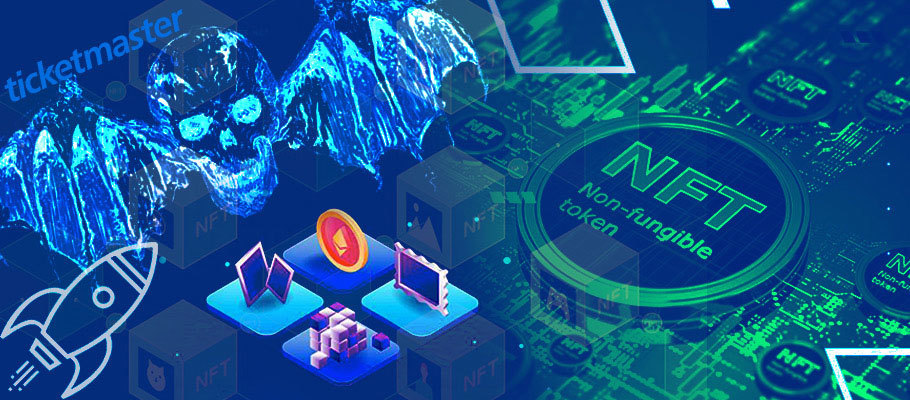
Published: March 29th, 2023
Experiments using NFTs as access passes for events have been reported for the past few months. Now ticketing giant Ticketmaster looks ready to take the practice to a mass market with the launch of a new service that lets artists offer elite access to live events for NFT owners.
The company announced the go-live this week for its new Ethereum NFT token-gating service. First to sign up is popular heavy metal band Avenged Sevenfold, which is using its own-brand Deathbats Club NFT collection to trial the token-gating feature prior to a full US national rollout.
In the band’s case, owners of its 10,000 Deathbats NFTs can take advantage of early access to tickets for upcoming performances in Los Angeles and New York city. An announcement on the band’s website said more than 1,000 tickets had already been purchased using the NFT-gating feature.
When users logon to buy their tickets, they’re prompted to link a wallet and verify ownership of an eligible NFT. When that’s done, the rest of the purchasing process is the same. The difference is, dedicated fans face less competition for tickets.
'Once you confirm NFT ownership it's just a normal ticket process,’ the band says, ‘minus 1,000-people in the purchase queue and bots run by scalpers scooping everything up in the first few hours.’
Deathbats Club NFT holders will have an exclusive presale for the band’s upcoming 13-date North American tour, which takes it to cities including Chicago, Minneapolis, and Montreal. For all 13 shows, special sections will be set aside in each venue for NFT token-gated holders.
Ticketmaster says it built the token gating feature with its dedicated in-house development team. To date its minted almost 15 million NFTs tied to live events, including professional sports matches. Any artist with its own NFT collection or partnership with an NFT community can take advantage of the token gating feature. The company says it can also build in bespoke functionality that gives fans extra benefits.
NFTs have had a roller-coaster ride in crypto markets over the past 18 months, seeing a surge in popularity alongside the wider crypto boom in 2021, the suffering losses when the crypto winter set in. Even in tough times there have been notable successes, but it takes more than brand name recognition to make an NFT offer fly.
The launch of Coinbase NFT, the cryptocurrency exchange’s NFT marketplace, is one example. It expanded and added new features in 2022 hoping to expand its small-ish base of crypto traders.
A number of enhancements were rolled out in July 2022, including a ‘like’ button, a ‘bulk manage’ dashboard, quick editing of list prices, upgraded trade analytics, and notifications. Coinbase has also added a time-delay function for new listings, a Facebook-like feed for follower news and activity, and the ability to link ten crypto wallets to a one Coinbase NFT account.
Despite all those features, a critical mass of NFT traders has yet to materialise. Figures from NFT data specialists Dune Analytics suggested Coinbase NFT had attracted roughly 8,200 unique buyers and sellers in the months immediately after launch. Two months after launch there had been 20,675 transactions for a total trading volume of USD 2.8 million, or 1,457 ETH.
Compared to other NFT marketplaces, Coinbase NFT was barely treading water. OpenSea, the top NFT marketplace, posted a trading volume of USD 15.5 million on a single day in July 2022. It boasts around three million registered users who have completed at least one transaction using the marketplace.
Response to the marketplace’s new features on Crypto Twitter was mixed, with some expressing worries about recent allegations that Coinbase has been selling user data (Coinbase denied the accusation), while others said the exchange botched the NFT marketplace launch.
Coinbase hasn’t throw in the towel. Development looks to be ongoing, regardless of layoffs and the tough crypto market conditions over the last 8-10 months.
Coinbase CEO Brian Armstrong has called Coinbase NFT a ‘Web3 social marketplace,’ inferring that success or failure can’t be assessed by on-chain metrics alone.
Coinbase is focused on ‘getting the product right’ and attracting more Coinbase NFT users. Monetizing them profitably will come later.
‘We aren’t obsessing over volume and transaction numbers,’ he said, though figures on user numbers, activity, and transaction growth were not forthcoming.
‘A lot of users on the platform are simply interacting with peers and counterparties, which is driving-up engagement through the use of social features. We're still early in beta with more new features in the dev pipeline. We want to keep giving the community reasons to use those features and make the marketplace more social than competitors.’
In an earnings call last year, Armstrong added that he was actually ‘very content’ with Coinbase NFT’s results to date and discussed adding support for more blockchains in the future. But how much cash is the exchange willing to commit to its NFT marketplace given the crypto market turmoil of the last year?
Coinbase President Emilie Choi told investors and investors that the company had devoted ‘less than 10 per cent’ of the company’s total budget to Coinbase NFT.
As the broader crypto market makes a comeback, how will non-fungible tokens fare? With major names like Ticketmaster jumping into the fray, perhaps good times really are on the horizon.
In February 2023 there was a surge in Ethereum NFT trading volumes in an evolving environment that saw challenger NFT marketplace Blur race past OpenSea, the former market leader.
Figures from DappRadar tracked USD 460 million in Ethereum NFT trades in early February, a 360 per cent jump over the previous week. OpenSea posted a 12 per cent rise in trading volume to USD 105 million in the same period.